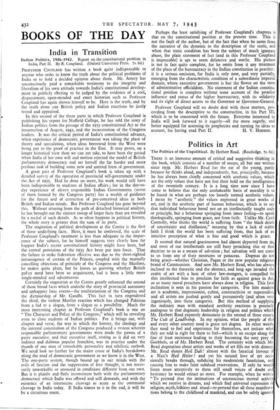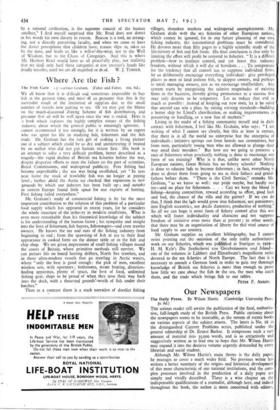Politics in Art
The Politics of the Unpolitical. By Herbert Read. (Routledge. 75. 6d.) THERE is an immense amount of critical and suggestive thinking in the book, which consists of a number bf essays, all but one written since 1939. Mr. Herbert Read has the ear of the young, partly because he thinks aloud, and independently, but, principally, because he has always been chiefly concerned with aesthetic values, which are the only values that have not lost their hold on the intelligentsia of the twentieth century. It is a long time now since I have come to believe that the only unshakeable basis of morality is to be found in what are perhaps too loosely termed aesthetic values. I mean by " aesthetic ' the values expressed in great works of art, and in the aesthetic part of human behaviour, which is to say that individual behaviour based not on an intellectually taught code or principle, but a behaviour springing from inner feeling—to speak theologically, springing from grace, not from faith. Unlike Mr. Cyril Connolly, who thinks the world is suffering from " the black death of uncertainty and disillusion," meaning by that a lack of stable faith I think the world has been suffering from, that lack of an intuitive perception of what is fine and good which is grace.
It seemed that natural graciousness had almost departed from xis, and most of our intellectuals are still busy preaching this or that doctrine to us as a means of salvation ; but salvation will not come to us froT any of their nostrtuns or panaceas. Dogmas do not bring grace—whether Christian, Pagan or the now popular religious brand of Communism. And now Mr. Herbert Read, who has always inclined to, the theoretic and the abstract, and long ago invaded the realm of art with a host of other law-mongers, is compelled by this intellectual bias to proclaim for faith as against grace in Art, as so many moral preachers have always done in religion. This fatal inclination is seen in his passion for categories. For him modern art is academic, impressionist, cubist, constructivist or superrealist, and all artists are pushed gently and persuasively (and often very ingeniously, into these categories. But this method of supplying the ordinary man with standard aesthetic reactions is precisely analogous to that dogmatic leadership in religion and politics which "Mr. Herbert Read expressly denounces in the second of these essays, The Cult of Leadership. In my opinion, what the people of this and every other country need is grace not dogma. In other words, they need to feel and experience for themselves, not imitate what they are told is right for them to feel—which is an escape along the line of least resistance leading to their becoming the easy prey of Goebbels, or of Mr. Herbert Read. The certainty with which Mr. Read dogmatises about artists and.works of art fills me with dismay. Mr. Read shouts Heil Dali! almost with the fanatical fervour a Nazi's Heil Hitler! and yet his natural love of art occa sionally breaks through, subduing his modernistic fanaticism, and causing him to make faint subdued reservations. If only he woul' listen more attentively to these still small voices of doubt an' hesitancy he would attract us more. For example, when he writes, "To pretend that the intimations of unconscious mental activit which we receive in dreams, and which find universal expression i religion, myth, folklore and ritualto pretend that all these manifests tions belong to the childhood of mankind, and can be safely ignore
-by a rational civilisation, is the supreme conceit of the human intellect," I find myself surprised that Mr. Read does not detect in his words his own slavery to reason. Reason is a tool, an arrang- ing, not a directly perceiving faculty, and when we cease to have the direct perceptions that children have, reason slips in, takes us by the nose, and leads us like a will-o'-the-wisp, not to the Well of Wisdom, but to the Chaos of Categories. And this is where Mr. Herbert Read would have us all peacefully, play, not realising that we shall only hurl these categories at one another's heads like
deadly missiles, until we are all stupefied or dead. W. J. TURNER.



























 Previous page
Previous page